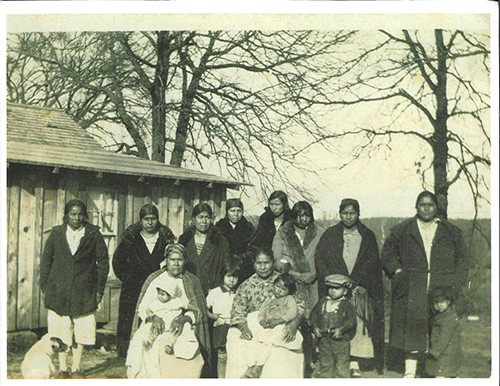Kialegee Tribe
By Adam Seibel

The Kialegee Tribe is based in Wetumka, but traces its roots to Alabama and Georgia. Beginning in 1835, the tribe was forcibly relocated to present-day Oklahoma during the Trail of Tears. The tribal name translates to “head off’ or decapitation, pointing toward their fighting spirit.
Tribal elder Sylvanna Caldwell recounted what has stood out to her when reflecting on the Trail of Tears.
“It was a hard, hard road through the Trail of Tears. What really stood out in my mind, is that at the time they were traveling in the winter and death was an everyday occurrence. They didn’t have a place to bury the babies, the children, and the knots in the trees; they would have to bury them there. The ground was hard and icy, and they were busy being moved,” Caldwell said. “A lot of them were barefoot and many died on the way.”
Caldwell said that from an early age the children were taught what it meant to be a Kialegee and how they should act and carry themselves in society.
Another elder, June Fixico, had a grandfather who came over with four of his sisters. During the Trail of Tears, Fixico said, nearly 166 Kialegee tribal members left Alabama to move to Oklahoma.
“Many of the children had to hide under their mother’s dresses, for some reason or another everything was aimed at the children,” Fixico said. She said sometimes the mothers would have the children hide in hollow trees and would return when it was safe to retrieve them.
The elders said that at one point the Kialegee tribe was large, but the Trail of Tears decimated the numbers.
“It’s been a hard road for this tribal town, but I’m proud of this tribal town. We’ve always managed to survive. We’ve took care of our members,” Fixico said.
Fixico said that the only reason they’ve made it this far and managed to survive is because of Christianity -- the Spirit that was given to the tribal people has kept the tribe moving forward through hardships.
Fixico said the men in the tribe tend to be more stoic and reserved. Tiger Hobia, a male elder, remained quiet during the interview.
Hobia is a former micco, which is head chief of the tribe. He said that if I returned I should bring him a pack of cigarettes. Tribal leaders then sent me on my way to Norman, nearly two hours away, with a sandwich for my drive back.
A few weeks later I returned to Wetumka to interview members of another tribe so I stopped by the Kialegee tribal town to drop off a pack of cigarettes I had purchased from a nearby gas station. Hobia thanked me, and one of the office workers told me it’s a sign of respect to give tobacco to a tribal elder.
Adam Seibel is a reporter with Gaylord News, a reporting project at the University of Oklahoma Gaylord College of Journalism and Mass Communication.







